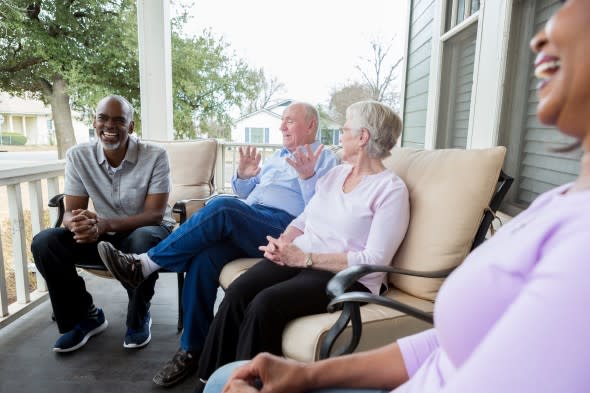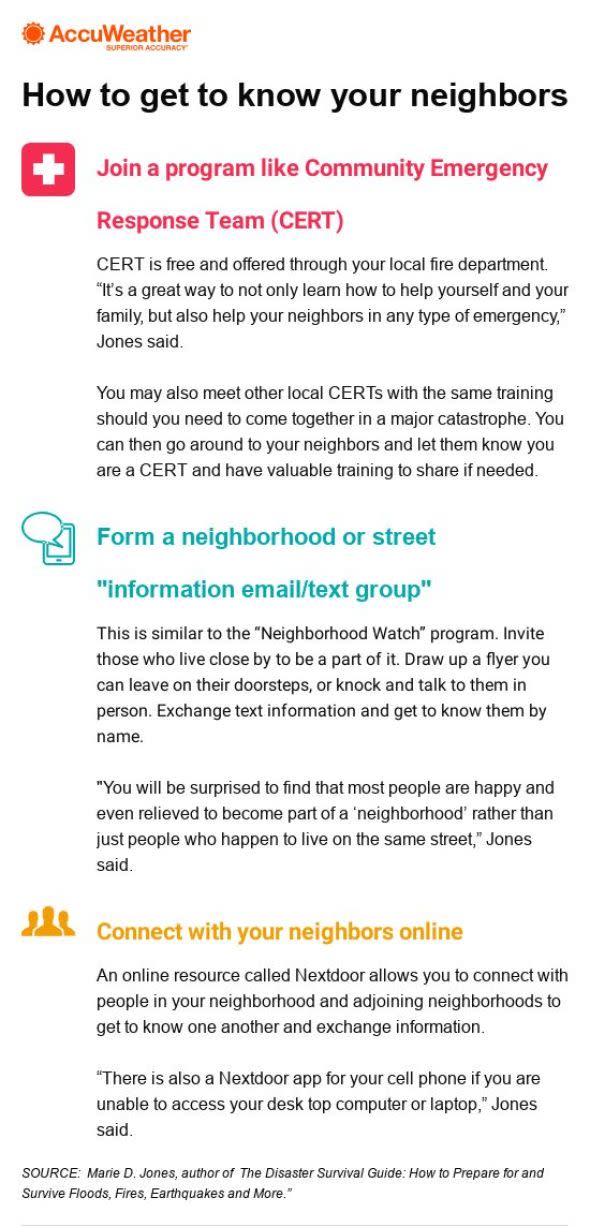Neighbors helping neighbors: How getting to know the people next door can save you during a natural disaster
During and after a natural disaster, your very survival could hinge on help from the people living around you.
A 2018 poll conducted by Branded Research found that about half of United States consumers believed knowing their neighbors would benefit them during a natural disaster. Just over one in five of respondents said that knowing their neighbors has actually helped them in such situations.
"These people are a somewhat permanent fixture in your daily life, and you spend far more time in their proximity than you do with family or friends," said Marie D. Jones, author of "The Disaster Survival Guide: How to Prepare for and Survive Floods, Fires, Earthquakes and More."
Apart from those living in your home at the time the event occurs, your neighbors will be the first people you interact with during a disaster or emergency, she said.

(Photo/asiseeit/Getty Images)
"During recent hurricanes, we watched news footage of people helping neighbors board up their homes, evacuate flooded areas using lifeboats and rowboats, assisting in getting pets out of flooding homes and delivering food and water to those who couldn't get to shelter in time," Jones said.
Not having a decent relationship with neighbors, or at least knowing their names, can cut you and your household off from valuable assistance.
"Knowing that everyone is working toward the same goal of surviving as individuals, families and as a community bonds neighbors together and gives them a sense of belonging that will serve everyone should disaster strike," Jones said.
Having someone to talk to
Simply having someone to talk to may be the most important way to remain focused and hopeful, according to Jones.
"I've lived through massive earthquakes, wildfires, blackouts and a blizzard or two as a child growing up in the Northeast," Jones said.
"Throughout these situations, being able to talk to others kept me sane, whether it was gathering around a makeshift fire pit during an 11-hour blackout, hanging out in a local park after a huge earthquake with total strangers sharing earthquake ‘horror stories,' or being in a Red Cross shelter and talking with others who had to leave their beloved homes behind," she said.
Sharing resources
Licensed Miami attorney and personal finance blogger Miguel A. Suro told AccuWeather that his and his wife's parents still live in their native Puerto Rico, where many residents benefited from neighborhood ties when Maria struck in 2017.
"Neighbors that had generators or emergency water supplies put up extension cords to their neighbors' homes so they would be able to power their refrigerators," Suro said. His wife's father owns a trucking business, and with the diesel stored in his home, he was able to offer fuel to his neighbors for their generators.
Jones' publicist, Pennsylvania resident Kae Tienstra, has a small mobile home in Alva, Florida, just east of Fort Myers. The community was devastated by Irma in 2017.
"A core group of 60 year-round residents sought shelter where they could," Tienstra said. A nearby homeowner opened her large home to at least 20 people, who sheltered there for several days.
Some residents captured videos and photos of damage so that homeowners not in the area could scope out what had happened to the community and individual properties.
Several snowbird residents were construction pros. Post-Irma, they drove down to Florida equipped with a plethora of beneficial supplies.
"They went house to house, cutting branches and trees, [removing] dangerous pieces of metal and securing tarps to waterproof each structure," Tienstra said. The backbreaking, hot and dangerous work earned them the title, ‘A-Team.'
"This close-knit group weathered the storm very well," Tienstra said.
Exchanging vital news and information
Sharing information can help everyone figure out how to survive until help comes to the neighborhood, according to Jones.
"There's probably one amateur radio operator around who can access news when cell phone service is down and power is out," she said.
When Hurricane Irma impacted Miami in 2017, Suro and his family evacuated to Washington, D.C. While they were away, knowing their neighbors proved an enormous help, Suro told AccuWeather.
"Our neighborhood WhatsApp group kept everyone informed of how the power and internet were coming back," he said. "We could know exactly which homes on which streets had their services restored."
The same neighbors kept watch on the Suro family's house and on general neighborhood conditions. "Since they knew us, they would also know if strangers were seen around our property and could alert us," Suro said.
Providing first aid
If you're seriously hurt, having a neighbor perform basic first aid can keep you alive until first responders arrive, Jones said.
"If you're trapped beneath debris, bleeding out from a severe wound or even if a family member is hurt and you lack the skills to treat them, knowing a neighbor who does is priceless," she said.
You may have skills that can assist your neighbors in the same way, she added. "Until help arrives, you and your neighbors become the first responders."

For more safety and preparedness tips, visit AccuWeather.com/Ready.

